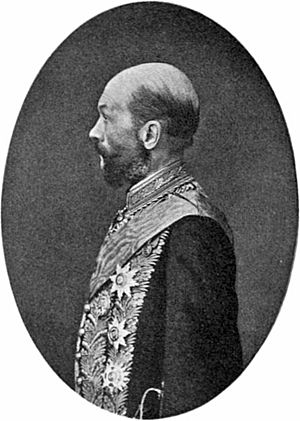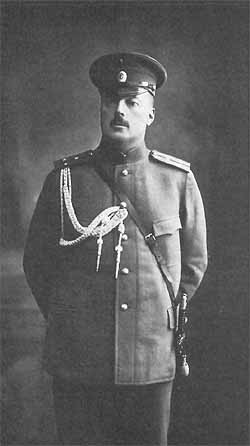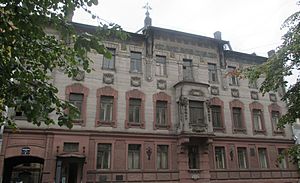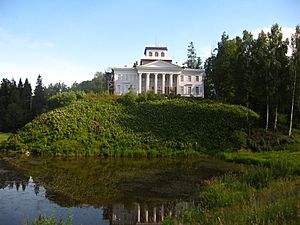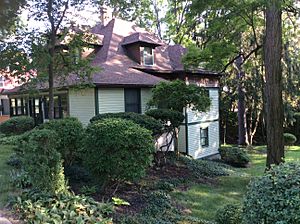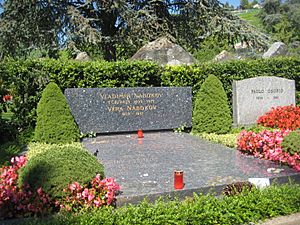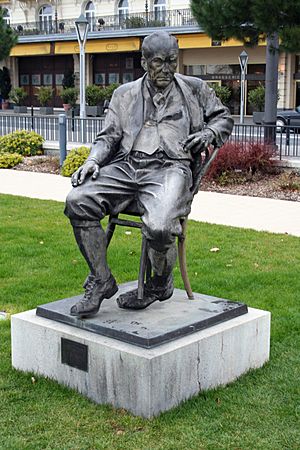Vladimir Nabokov facts for kids
Quick facts for kids
Vladimir Nabokov
|
|
|---|---|
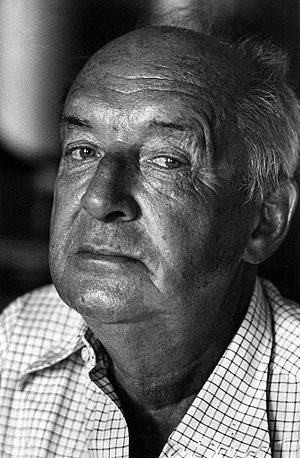
Nabokov in Montreux, Switzerland, 1973
|
|
| Native name |
Владимир Набоков
|
| Born | 22 April [O.S. 10 April] 1899 Saint Petersburg, Russian Empire |
| Died | 2 July 1977 (aged 78) Montreux, Switzerland |
| Pen name | Vladimir Sirin |
| Occupation | Novelist, professor |
| Nationality |
|
| Alma mater | University of Cambridge |
| Literary movement | Modernism, postmodernism |
| Employer | Cornell University |
| Notable works |
|
| Spouse | Véra Nabokova |
| Children | Dmitri Nabokov |
| Signature | |
|
|
|
Vladimir Vladimirovich Nabokov (Russian: Владимир Владимирович Набоков; April 22, 1899 – July 2, 1977) was a famous Russian-American writer, poet, and scientist. He was also known by his pen name, Vladimir Sirin.
Born in Imperial Russia in 1899, Nabokov wrote his first nine novels in Russian. This was while he lived in Berlin, where he met his wife. He became very famous around the world after moving to the United States. There, he started writing in English. Nabokov became an American citizen in 1945. He lived mostly on the East Coast before returning to Europe in 1961. He then settled in Montreux, Switzerland.
From 1948 to 1959, Nabokov was a professor of Russian literature at Cornell University. His 1955 novel Lolita is considered one of the greatest works of the 20th century. His memoir, Speak, Memory, published in 1951, is also highly praised. Nabokov was also an expert on butterflies and a creator of chess problems.
Contents
Vladimir Nabokov's Early Life and School
Childhood in Russia
Vladimir Nabokov was born on April 22, 1899, in Saint Petersburg, Russia. His family was very wealthy and important. They were part of the Russian nobility. His father, Vladimir Dmitrievich Nabokov, was a lawyer, politician, and journalist. His mother, Yelena Ivanovna, came from a rich family.
Vladimir was the oldest of five children. He had a brother, Sergey, and three sisters, Olga, Elena, and Kirill. Sadly, Sergey died in a Nazi concentration camp in 1945. Elena, his favorite sister later in life, published their letters.
Nabokov spent his childhood in Saint Petersburg and at a country estate called Vyra. He described his childhood as "perfect" and "cosmopolitan". His family spoke Russian, English, and French at home. Vladimir learned all three languages from a young age. He could read and write in English before he could in Russian. In his memoir Speak, Memory, he shared many details of his special childhood.
In 1916, Nabokov inherited another estate, Rozhdestveno, from his uncle. He lost it just one year later during the October Revolution. This was the only house he ever owned.
Nabokov started writing seriously when he was a teenager. In 1916, he published his first book, Stikhi ("Poems"). It was a collection of 68 Russian poems.
Leaving Russia after the Revolution
After the 1917 February Revolution, Nabokov's father became a secretary in the Russian government. But after the October Revolution, the family had to leave Saint Petersburg. They moved to Crimea, not thinking they would be gone for long. His father became a minister of justice there.
When the German Army left and the White Army was defeated, the Nabokovs sought safety in western Europe. Many other Russian refugees did the same.
Studying at Cambridge University
The family settled in England for a short time. Nabokov was accepted into the University of Cambridge, a very famous university. He studied zoology (the study of animals) and later Slavic and Romance languages.
He did very well in his exams. He used his experiences at Cambridge to write some of his novels, like Glory. At Cambridge, Nabokov decided firmly that he wanted to become a Russian writer.
Vladimir Nabokov's Career as a Writer
Life in Berlin (1922–1937)
In 1920, Nabokov's family moved to Berlin, Germany. His father started a newspaper for Russian people living outside of Russia. Nabokov joined them two years later after finishing his studies at Cambridge.
In March 1922, Nabokov's father was shot and killed in Berlin. He was protecting a political leader. Nabokov often wrote about his father's death in his books. After this tragedy, Nabokov's mother and sister moved to Prague.
Nabokov stayed in Berlin. He became a known poet and writer among the Russian community there. He published his works using the name V. Sirin. To earn money, he taught languages and gave tennis and boxing lessons. He did not like Berlin much and lived mostly within the Russian community.
Marriage and Family
In 1922, Nabokov was engaged to Svetlana Siewert, but her parents ended it. In May 1923, he met Véra Evseyevna Slonim. She was a Russian-Jewish woman. They got married in April 1925. Their only child, Dmitri, was born in 1934.
In 1936, Véra lost her job because of the growing anti-Jewish feelings in Germany. Nabokov then started looking for a job in English-speaking countries.
Moving to France (1937–1940)
In 1937, Nabokov left Germany for France. His family followed him. They lived in different cities in France, finally settling in Paris. Paris also had a community of Russian people who had left their home country.
In 1939, in Paris, Nabokov wrote a short novel called The Enchanter. This was his last work written in Russian.
In May 1940, the Nabokovs had to flee again because German troops were advancing. They traveled to the United States. Nabokov's brother Sergei stayed in France and died in a concentration camp in 1945.
Life in the United States
New York City (1940–1941)
The Nabokovs settled in Manhattan, New York. Vladimir started volunteering as an entomologist (a scientist who studies insects) at the American Museum of Natural History.
Teaching at Wellesley College (1941–1948)
In 1941, Nabokov joined Wellesley College as a lecturer. This job gave him money and time to write and study butterflies. He is known for starting Wellesley's Russian department. The Nabokovs lived in Wellesley, Massachusetts, and later in nearby Cambridge. In 1945, he became a citizen of the United States. He taught Russian language and literature. His classes were popular because of his unique teaching style. At the same time, he also worked with the butterfly collection at Harvard University's Museum of Comparative Zoology.
Professor at Cornell University (1948–1959)
In 1948, Nabokov moved to Cornell University. He taught Russian and European literature there until 1959. One of his students was Ruth Bader Ginsburg, who later became a U.S. Supreme Court Justice. She said Nabokov greatly influenced her writing.
Nabokov wrote his famous novel Lolita while on trips to collect butterflies in the western U.S. He took these trips every summer. His wife, Véra, helped him a lot. She was his "secretary, typist, editor, proofreader, translator, and driver." She even stopped him from burning early drafts of Lolita. He called her the best-humored woman he had ever known.
In June 1953, Nabokov and his family went to Ashland, Oregon. He finished Lolita there and started writing another novel, Pnin. He explored the mountains nearby, looking for butterflies.
Return to Europe: Montreux (1961–1977)
After Lolita became a big financial success, Nabokov returned to Europe. He wanted to focus only on writing. In 1961, he and Véra moved to the Montreux Palace Hotel in Montreux, Switzerland. He lived there for the rest of his life. From his hotel room, he managed his work and took trips to the Alps, Corsica, and Sicily to hunt butterflies.
His Death
Nabokov died on July 2, 1977, in Montreux. He was buried in Clarens cemetery in Montreux.
When he died, he was working on a novel called The Original of Laura. His wife and son, Véra and Dmitri, decided to publish the unfinished book in 2009, even though Nabokov had asked them to burn it.
Vladimir Nabokov's Works
Lectures at Cornell University
Nabokov's lectures at Cornell University showed his unique ideas about art. He believed that novels should not try to teach lessons. Instead, readers should enjoy the beauty of the writing style and structure. He did not like "general ideas" in novels. For example, when teaching Ulysses, he wanted students to focus on where the characters were in Dublin, not on the complex history. He was very strict about grading and wanted students to describe details, not just the story.
Vladimir Nabokov's Influence
Many writers have been influenced by Nabokov. The critic James Wood said that Nabokov's detailed descriptions had a big impact on writers who came after him. These include authors like Martin Amis and John Updike. Thomas Pynchon, a famous writer, attended Nabokov's lectures at Cornell.
Other authors like John Banville, Don DeLillo, Salman Rushdie, and Edmund White were also influenced by him. Michael Chabon, a Pulitzer Prize-winning novelist, said that Lolita and Pale Fire changed his life. He admired how Nabokov's English combined beautiful language with clear precision. Jeffrey Eugenides, another Pulitzer Prize winner, called Nabokov one of his favorite writers.
Vladimir Nabokov's Love for Entomology
Nabokov's interest in entomology (the study of insects) began when he found books about butterflies in his family's country home. He never learned to drive a car, so his wife drove him to places where he could collect butterflies.
In the 1940s, he helped organize the butterfly collection at Harvard University's Museum of Comparative Zoology. His writings on this topic were very technical. The genus Nabokovia was named after him because of his work. Many butterfly and moth species also have names related to Nabokov or his novels.
In 1967, Nabokov said that the joy of finding a new butterfly species was greater than the joy of writing. He even thought that if there had been no revolution in Russia, he might have spent his whole life studying butterflies instead of writing novels.
Scientists did not take Nabokov's butterfly work very seriously when he was alive. However, new genetic research supports one of his ideas. He thought that a group of butterfly species, called the Polyommatus blues, came to the New World (the Americas) from Asia. They crossed the Bering Strait in five waves and eventually reached Chile.
Some people think Nabokov's scientific work helped his writing. Others believe his love for detail, thinking deeply, and symmetry led to both his science and his art.
Vladimir Nabokov's Political Views
Russian Politics
Nabokov was a classical liberal, just like his father. His father was a liberal politician who served in the Russian government after the 1917 February Revolution. In Speak, Memory, Nabokov proudly wrote about his father's fight against harsh rule and his strong opposition to the death penalty.
Nabokov was a "White Russian," meaning he was strongly against the Soviet government that took power after the Bolshevik Revolution in October 1917. He believed in freedom and was against both the old Russian monarchy, communism, and fascism.
Nabokov's father was a strong defender of Jewish rights in Russia. This was a family tradition. Vladimir Nabokov also spoke out against anti-Jewish feelings in his writings. In the 1930s, he was able to escape Germany with the help of Russian Jewish people. They remembered his family's help to Jews in the past.
In 1969, when asked if he wanted to visit Russia again, he said no. He felt there was nothing left to see that interested him. He preferred to keep the images of his childhood home in his mind.
American Politics
In the 1940s, after moving to America, Nabokov saw a connection between American democracy and the goals of the short-lived Russian government he supported. In 1942, he said: "Democracy is humanity at its best... it is the natural condition of every man."
During the 1960s, he showed strong dislike for some protest movements. He called the protesters "conformists" and "goofy hoodlums." He supported the Vietnam War and admired Presidents Lyndon B. Johnson and Richard Nixon. Nabokov was also horrified by racism against African-Americans. He used Alexander Pushkin's mixed racial background to argue against segregation.
Vladimir Nabokov's Personal Life
Synesthesia
Nabokov had a special ability called synesthesia. This means that when he experienced one sense, another sense would also be triggered. For example, he saw the number five as the color red. He often gave his characters this same gift. His wife also had synesthesia, and they found that their son Dmitri did too. Dmitri's colors for letters were sometimes a mix of his parents' colors.
Religion
Nabokov was an agnostic. This means he believed that it's impossible to know for sure if God exists. He was open about his lack of interest in organized religion or any church.
Chess Problems
Nabokov spent a lot of time creating chess problems. He published them in Russian newspapers in Germany. He described creating a chess problem as a "formidable" mental challenge. He felt that the "originality, invention, conciseness, harmony, complexity, and splendid insincerity" of chess problems were similar to other forms of art.
List of Works
See also
 In Spanish: Vladímir Nabokov para niños
In Spanish: Vladímir Nabokov para niños
 | Jackie Robinson |
 | Jack Johnson |
 | Althea Gibson |
 | Arthur Ashe |
 | Muhammad Ali |


